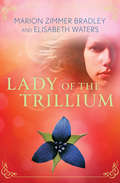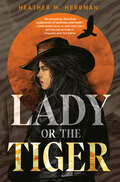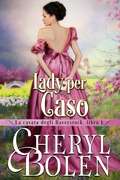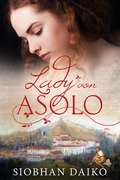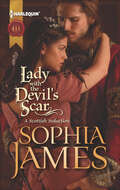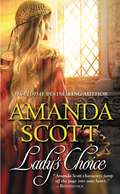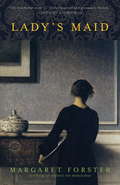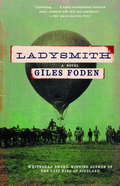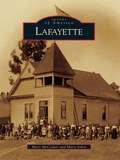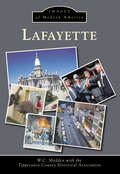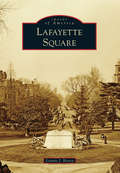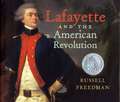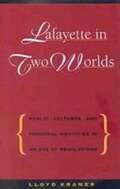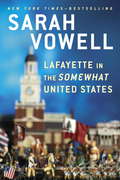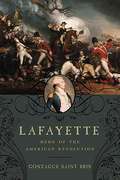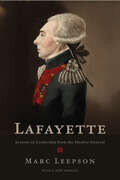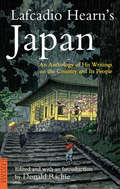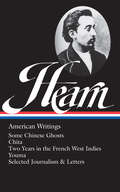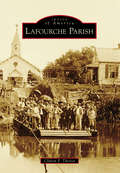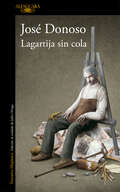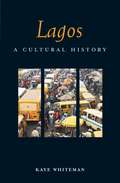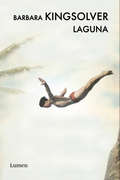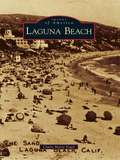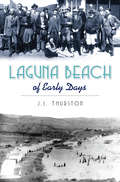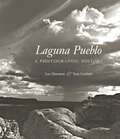- Table View
- List View
Lady of the Trillium (The Saga of the Trillium #4)
by Marion Zimmer Bradley Elisabeth WatersTorn between love and duty, a reluctant young acolyte will be called on to magically save her imperiled world in this enthralling chapter of the Saga of the Trillium Of the three royal siblings who made up the Petals of the Living Trillium, only Lady Haramis survives nine hundred years after the events that nearly devastated their realm. But the Archimage is old and ill, and a successor must be found if Ruwenda is to remain safe and protected. In Princess Mikayla, Haramis recognizes the ideal candidate. However, the impulsive teenager must be carefully schooled in the magic arts--and the headstrong youth isn't certain she even wants the responsibility, especially if it means abandoning her one true love. But time is running out--for Haramis and for the kingdom. And with disaster looming, the fate of Mikayla's endangered homeland may soon fall heavily on the shoulders of a young, only half-trained rebel, ready or not. Revisiting the magnificent world she created with fellow fantasy luminaries Julian May and Andre Norton in Black Trillium, the remarkable Marion Zimmer Bradley joins coauthor Elisabeth Waters to gaze into the far future of the World of the Three Moons. Lady of the Trillium is an enthralling, unforgettable tale of destiny, duty, magic, love, and the seemingly unbridgeable chasm between old and young.
Lady or the Tiger
by Heather M. HerrmanA twisty, darkly seductive anti-hero origin story, starring a teenage killer whose trial in the Wild West is upended when her first victim, her husband, arrives alive with a story to tell.Summer 1886—When nineteen-year-old Belle King turns herself in for murder, the last thing she expects to see is her abusive husband Reginald standing outside her Dodge City jail cell, impossibly alive. He&’s there to take her back, but Belle is not going without a fight. Reginald was the first man she ever meant to kill, but certainly not the last . . .Now, while there are still bars between them, Belle is forced to resort to all the tricks in her arsenal to prevent her husband from ever being in control of her again. But in the 1880s, the last soul anyone will believe is a girl—even when she confesses to her own crimes.With the seductive horror of a fairy tale, Lady or the Tiger is the dark, twisty story of how one mountain girl from Kentucky became the wickedest woman in the Wild West and an ode to girls with tigers in their hearts who can save themselves.
Lady per caso
by Cheryl Bolen F. RossiCheryl Bolen l'ha fatta ancora: uno scintillante romance Regency... ve lo consiglio! - Happily Ever After Anna de Mouchet ha la stoffa delle eroine Regency, quella giusta! – In Print *** Manipolati in un matrimonio di convenienza per provare il loro patriottismo, Anna e Charles, il marchese di Haverstock, mettono in dubbio la lealtà l'uno dell'altra. Ma non ci sono dubbi: il tocco di seta di Anna ha stregato il potente lord che è diventato suo marito, e di certo anche lei desidera ardentemente ogni minuto tra le sue braccia.
Lady von Asolo
by Jessica Kallweit Siobhan DaikoWir können die Vergangenheit nicht ändern, aber die Vergangenheit uns... Asolo, Veneto, Norditalien, 1504, Cecilia tritt dem Hof der Königin Caterina Cornaro bei und entzündet das Interesse von zwei Männern, einem reichen Aristokraten und einem mittellosen Künstler, dabei eine Geschichte von Leidenschaft und Intrige in Bewegung setzend, die sie in Lebensgefahr bringt. Fünfhundert Jahre später besucht Fern ihre Tante in Asolo, um Trost nach einem kürzlich geschehenen traumatischen Ereigniss zu finden. Dort werden ihre furchbaren Träume von Verbrennungstoden Realität, als sie in der Zeit zurückschlittert und die Welt mehr und mehr durch Cecilias Augen betrachtet. Bald beginnt der Wiederhall der Vergangenheit sich in der Gegenwart zu manifestieren. Kann Fern sich von der Gefahr fernhalten und sich mit ihrer eigenen Vergangenheit abfinden? Von der Villa der Freuden der herrschenden Königin, bis zum Venedig des 16. Jahrhunderts, Siobhan Daikos Buch wird Sie auf eine wohlriechende Reise sinnlicher Romantik, höfischer Verschwörungen und endlicher Erlösung mitnehmen.
Lady with the Devil's Scar
by Sophia JamesA mysterious warrior unlocks a guarded lady’s heart in this medieval Scottish romance.Badly disfigured Lady Isobel Dalceann has fought fiercely to defend her keep, with little thought for her safety. Why, then, has she let a stranger within her walls? While he threatens danger, his battered body marked by war mirrors her own scars and tempts her to put her faith in him.Marc de Courtenay is a mercenary and a loner, although he is drawn to damaged, beautiful Isobel. But in taking him into her highly defended, buttressed walls, she has unwittingly given him secrets that will enable him to betray her. What would she do if she were ever to find out who he really is. . . ?
Lady's Choice: Ravenwood's Lady And Lady Brittany's Choice (Isles/Templars #4)
by Amanda ScottLady Sorcha Macleod is certain that the man her sister Adela loves, the dashing Scottish Knight Templar Sir Hugo Robinson, is the masked rider who kidnaps Adela on her wedding day. When she learns he is not, she sets off to rescue Adela with Hugo in hot pursuit. On the road with the irrepressible Sorcha, Hugo soon discovers a woman of fire and beauty, a woman he longs to touch and taste-but his honor forbids it, because he is bound by his vow to marry Adela. As a cruel mastermind plots to steal the Templars' storied treasure and keep Adela for himself, Sorcha and Hugo will risk everything, even their own destiny, to save her and to protect the Templars' long-held secret. Word Count: 110,000 words.
Lady's Maid
by Margaret Forster"Absorbing...Heartbreaking...Forster paints a vivid picture of class, station, hypocrisy and survival in Victorian society....Grips the reader's imagination on every page."-- SAN FRANCISCO CHRONICLEShe was Elizabeth Barrett's lady's maid. But "Wilson" was more than that. She was a confidante, friend and conspirator in Elizabeth's forbidden romance with Robert Browning. Wilson stayed with Elizabeth for sixteen years, through every trial and crisis, and when Wilson's affairs took a dramatic turn she expected the same loyalty from Elizabeth....
Ladysmith
by Giles FodenFrom the author of the Whitbread Award-winning The Last King of Scotland comes a spellbinding tale of a town under siege in colonial Africa and a young woman who finds love and freedom in the midst of a devastating war.The year is 1899, and the South African town of Ladysmith is surrounded by Boer forces. No one expects the siege to last, but it does, for a harrowing 120 days -- four months of dire emergency: food shortages during which bread is made with laundry detergent and the soldiers' horses are killed to feed the troops; bombings that force the townspeople into tunnels and makeshift shelters. But in the thick of shells and shrapnel, disease and deprivation, one young woman discovers an unexpected freedom: a chance to break old loyalties and establish new loves. Even as the world she knows collapses around her, Bella Kiernan finds the courage to escape from convention, to rebel against the political forces that threaten her homeland and to pursue her life's greatest romance. Based in part on the letters of Foden's great-grandfather, a British trooper, Ladysmith is a magnificent love story, a vivid portrait of the first modern war of the twentieth century and clear confirmation of Giles Foden's standing as one of Britain's most formidably talented young novelists.From the Hardcover edition.
Lafayette
by Mary Mccosker Mary SolonToday's Lafayette is a modern East Bay suburb with a long and intriguing history of people, agriculture, and commerce. The story began in the summer of 1846, when Elam Brown and 13 families left St. Joseph, Missouri, in wagon trains and embarked on a sixmonth journey west to establish new homes and lives. By February 1848, Brown and his family had purchased the Rancho Acalanes in Contra Costa County from a San Francisco financier and had established the settlement that would later became Lafayette. Gradually Brown sold his land to other settlers, and the community began to grow. Eventually homes, stores, roads, schools, and churches were built. In these pages, the genesis of Lafayette, along with the story of its creators and early residents, is revealed in stirring early imagery.
Lafayette
by W. C. Madden Tippecanoe County Historical AssociationFounded as a "River Town" in 1825, Lafayette grew quickly and became a city in 1853. It was named after the famous French general Marquis de Lafayette, who helped America win its independence from England. In its more than 150 years in existence, Lafayette has come a long way. After the city celebrated its centennial, its growth remained stagnant from the 1960s through the 1990s. However, the addition of a Subaru plant and Wabash National changed this and started a movement that has turned the city into a major industrial and population center in the Hoosier state. Its continued economic growth is almost assured with the expansion of several plants and the addition of other companies.
Lafayette Square
by Lonnie J. HoveyLafayette Square's rich history dates back to the founding of the District of Columbia when Pierre L'Enfant planned it as part of the grounds for the president's house. The square was one of the first open spaces within the city to be designed as a public park. Across Pennsylvania Avenue from the White House, the park's neighborhood became home to presidents, vice presidents, cabinet members, diplomats, inventors, journalists, heroes, authors, scientists, law breakers, and scoundrels. Today, the square and its sculptures are surrounded by government offices, but symbolically, it is the White House's front yard, making it an attractive destination. Using historic photographs, Lafayette Square captures the square's social, political, and architectural history, highlighting important past events.
Lafayette and the American Revolution
by Russell FreedmanWhen the Marquis de Lafayette ran off to join the American Revolution, he was a strong-willed nineteen-year-old who had never set foot on a battlefield. He was also one of the richest men in France. Determined to prove his mettle, he defied his family and even the king of France with his actions. Although at first Lafayette was granted an honorary commission out of deference for his title and wealth, he quickly earned the respect of his fellow officers with his courage, devotion to liberty, and unstoppable drive. He joined Washington during the difficult winter at Valley Forge and won the first president's lifelong friendship. Playing a pivotal role in the conflict, Lafayette persuaded the French government to send troops and ships as reinforcements for the Americans, negotiated crucial pacts with the Iroquois Six Nations, and helped lead troops to victory at Yorktown. Russell Freedman's thrilling account tells the story of an adventurer who made history before he was even out of his teens.<P><P> Winner of the Sibert Honor
Lafayette in Two Worlds
by Lloyd S. KramerLloyd Kramer offers a new interpretation of the cultural and political significance of the career of the Marquis de Lafayette, which spanned the American Revolution, the French Revolutions of 1789 and 1830, and the Polish Uprising of 1830-31. Moving beyond traditional biography, Kramer traces the wide-ranging influence of Lafayette's public and personal life, including his contributions to the emergence of nationalist ideologies in Europe and America, his extensive connections with liberal political theorists, and his close friendships with prominent writers, many of them women. Kramer places Lafayette on the cusp of the two worlds of America and France, politics and literature, the Enlightenment and the Romantic movement, public affairs and private life, revolution and nationalism, and men and women. He argues that Lafayette's experiences reveal how public figures can symbolize the aspirations of a society as a whole, and he stresses Lafayette's important role in a cultural network of contemporaries that included Germaine de Stael, Benjamin Constant, Frances Wright, James Fenimore Cooper, and Alexis de Tocqueville. History/Biography
Lafayette in the Somewhat United States
by Sarah VowellFrom the bestselling author of Assassination Vacation and The Partly Cloudy Patriot, an insightful and unconventional account of George Washington's trusted officer and friend, that swashbuckling teenage French aristocrat the Marquis de Lafayette. Chronicling General Lafayette's years in Washington's army, Vowell reflects on the ideals of the American Revolution versus the reality of the Revolutionary War. Riding shotgun with Lafayette, Vowell swerves from the high-minded debates of Independence Hall to the frozen wasteland of Valley Forge, from bloody battlefields to the Palace of Versailles, bumping into John Adams, Thomas Jefferson, Lord Cornwallis, Benjamin Franklin, Marie Antoinette and various kings, Quakers and redcoats along the way. Drawn to the patriots' war out of a lust for glory, Enlightenment ideas and the traditional French hatred for the British, young Lafayette crossed the Atlantic expecting to join forces with an undivided people, encountering instead fault lines between the Continental Congress and the Continental Army, rebel and loyalist inhabitants, and a conspiracy to fire George Washington, the one man holding together the rickety, seemingly doomed patriot cause. While Vowell's yarn is full of the bickering and infighting that marks the American past--and present--her telling of the Revolution is just as much a story of friendship: between Washington and Lafayette, between the Americans and their French allies and, most of all between Lafayette and the American people. Coinciding with one of the most contentious presidential elections in American history, Vowell lingers over the elderly Lafayette's sentimental return tour of America in 1824, when three fourths of the population of New York City turned out to welcome him ashore. As a Frenchman and the last surviving general of the Continental Army, Lafayette belonged to neither North nor South, to no political party or faction. He was a walking, talking reminder of the sacrifices and bravery of the revolutionary generation and what the founders hoped this country could be. His return was not just a reunion with his beloved Americans it was a reunion for Americans with their own astonishing, singular past. Vowell's narrative look at our somewhat united states is humorous, irreverent and wholly original.From the Hardcover edition.
Lafayette: Hero of the American Revolution
by George Holoch Gonzague Saint BrisThe rousing story of Lafayette--aide-de-camp and "adopted son" of George Washington--exploring his vital role in the American Revolution. In this long-overdue history of Marquis Gilbert de Lafayette, acclaimed French author Gonzague Saint Bris recounts Lafayette's invaluable contributions to the American War of Independence and, later, the French Revolution of 1789. The first study of Lafayette to appear in almost ten years, Saint Bris' new volume recounts the young Lafayette's personal friendship with George Washington, who went so far as to refer to Lafayette as his "adopted son," and his pivotal role as Washington's aide-de-camp in helping establish the fledgling American nation. Lafayette's presence at the British surrender at Yorktown is a stark reminder of just how closely our forefather's victory hinged on the help of our French allies, who were roused into action by Lafayette himself. equally absorbing and less well known is Lafayette's idealistic but naive efforts to plant the fruits of the American-style democracy he so admired in the unreceptive soil of his homeland.
Lafayette: Lessons in Leadership from the Idealist General
by Marc LeepsonAssessing the legendary Frenchman and his remarkable military career on both sides of the Atlantic The Marquis de Lafayette is an icon of both American and French history. In Marc Leepson&’s concise and engaging biography of this captivating figure, we learn how Lafayette, born into an aristocratic French family of warriors, traveled to the colonies at the age of nineteen to fight as a volunteer in the American Revolutionary War. Continental Army Major General Lafayette was soon embraced by George Washington and Thomas Jefferson, who became his lifelong friends. A fearless, accomplished battlefield commander, he also helped to convince the French court to provide crucial financial and military support to the Americans, which aided their defeat of the British. On his return to France, Lafayette played a leading role in the movement to make France a constitutional monarchy, served as commander of the National Guard during the French Revolution, and as a member of the Chamber of Deputies, opposed Napoleon&’s rule and was instrumental in ending the short-lived French July Revolution of 1830 that brought the &“citizen king,&” Louis-Philippe, to the throne. This focused biography of the legendary French statesman and military man offers a unique examination of his remarkable military career on both sides of the Atlantic.
Lafcadio Hearn's Japan
by Lafcadio Hearn Donald RichieOver one hundred years after his death, author, translator and educator Lafcadio Hearn remains one of the best-known Westerners ever to make Japan his home. His prolific writings on things Japanese helped shape Western views on Japan well into the twentieth century.This masterful anthology compiled by Donald Richie is organized into two parts.Part One, "The Land", chronicles Hearn's early years, when he wrote primarily about the appearance of his new home.Part Two, "The People", records the author's later years, when he came to terms with the Japanese themselves.
Lafcadio Hearn: Some Chinese Ghosts / Chita / Two Years in the French West Indies / Youma / selected journalism and letters (The Library of America #190)
by Lafcadio Hearn Christopher BenfeyA translator of Flaubert and Gautier, Lafcadio Hearn was the master of a gaudy and sometimes self-consciously decadent literary style, but he was also a tough-minded and keenly observant reporter, with an eye for the offbeat, the sensual, and occasionally the gruesome. The writings of his American years collected in this Library of America volume—on subjects as wide ranging as comparative folklore, the history of musical instruments, French literary avant-gardes, and New Orleans voodoo—reveal an omnivorous curiosity and an always eclectic sensibility.Some Chinese Ghosts (1887), a stylized retelling of ancient legends, foreshadows Hearn's later fascination with Asian themes. The exquisitely crafted novels Chita (1889), about the devastation wrought by a Louisiana hurricane, and Youma (1890), about a slave rebellion in Martinique, epitomize his writing at its most luxuriantly romantic, alert to the interactions of diverse cultures and suffused with imagistic splendor. His extraordinary travel book Two Years in the French West Indies (1890), presented here with the many illustrations from its first edition, provides a richly impressionistic account of his long stay on Martinique and other Caribbean islands.More than two dozen examples of Hearn's journalism from the 1870s and 1880s are also included here, evoking vanished worlds with incomparable vividness: a raucous African-American nightclub on the Cincinnati waterfront; an execution; scenes of Mardi Gras and the New Orleans French Quarter; an uncharted village of Filipino fishermen in a remote Louisiana bayou. The volume is rounded out with a revealing selection of Hearn's impassioned letters, many published here for the first time in unexpurgated form.LIBRARY OF AMERICA is an independent nonprofit cultural organization founded in 1979 to preserve our nation’s literary heritage by publishing, and keeping permanently in print, America’s best and most significant writing. The Library of America series includes more than 300 volumes to date, authoritative editions that average 1,000 pages in length, feature cloth covers, sewn bindings, and ribbon markers, and are printed on premium acid-free paper that will last for centuries.
Lafourche Parish (Images of America)
by Clifton TheriotLafourche is a parish rich in history and culture known for its close-knit, family-centered communities. The towns and communities of Lafourche were settled along its namesake, Bayou Lafourche, which bisects the parish from its northern boundary to its southern boundary at the Gulf of Mexico. Because of the continuous pattern of homes and businesses built along the bayou, many refer to the bayou as the "Longest Street in the World." The parish was originally inhabited by Native American tribes and later by European, African, and English settlers. Many of the residents of Lafourche can trace their ancestry back to these early settlers, strengthening the sense of community that is distinctive to southern Louisiana. The fertile bayou delta fostered small vegetable farms as well as large sugarcane plantations that continue to thrive. The numerous waterways and marshes of the parish produce bountiful catches of fish, seafood, and other wildlife, giving rise to its reputation as a sportsmen's paradise. The parish's economy is also made up of a shipbuilding industry and the onshore and offshore oil industry.
Lagartija sin cola
by José DonosoProyecto literario que José Donoso empezó a escribir en 1973 y que abandonó por razones desconocidas. Lagartija sin cola recupera para los lectores la prosa nítida y definitiva de José Donoso, así como también algunas de sus obsesiones, a través de una historia tan irónica como melancólica sobre la pérdida de España bajo las hordas del turismo, paralela a la de un artista que renuncia al arte, decepcionado por su mercantilización. Derrotado y escondido en Barcelona, el protagonista de esta novela, el pintor Armando Muñoz-Roa, narra la historia de la fuga que emprendió en compañía de Luisa, su prima, amante y benefactora, tras abandonar con escándalo el movimiento informalista, al que perteneció con cierto éxito. Solo, viejo y frustrado, el artista recuerda sus años en el pueblo de Dors, al que intentó rescatar del avance de la modernidad, y la decadencia de su propia familia, amenazada también por el cambio de los tiempos. Esta novela, que José Donoso empezó a escribir en 1973 y que abandonó por razones desconocidas, fue descubierta por su hija, Pilar, entre los papeles que su padre vendió a la Biblioteca de la Universidad de Princeton. El manuscrito original, que incluye las correcciones del autor, fue revisado por el crítico Julio Ortega, quien afirma haberse limitado a facilitar el acceso al texto.
Lagos: A Cultural History (Interlink Cultural Histories)
by Kye WhitemanLagos is one of the fastest growing cities in the world, expected in some projections to have a population of 25 million by 2025. This will make it the biggest metropolis in sub-Saharan Africa and possibly the world's third largest city.<P><P> This phenomenal and continuing growth gives it a heady turbulence, especially as it only took on the form of a coherent urban entity in the eighteenth century. After Nigeria's independence Lagos remained both a trading hub and, for thirty years, a federal capital and political vortex. Now, its driving sense of "can-do," its outreach and vitality, make it a fulcrum and a channel for commercial and cultural talent.Kaye Whiteman explores a city that has constantly re-invented itself, from the first settlement on an uninhabited island to the creation of the port in the early years of the twentieth century. Lagos is still defined by its curious network of islands and lagoons, where erosion and reclamation lead to a permanently shifting topography, but history has thrust it into the role of burgeoning mega-city, overcoming all nature's obstacles. The city's melting-pot has fertilized a unique literary and artistic flowering that is only now beginning to be appreciated by a world that has only seen slums and chaos.
Laguna
by Barbara KingsolverHarrison Shepherd había nacido en Estados Unidos, pero cuando aún era un niño tuvo que irse a México tras los pasos de una madre siempre en busca del hombre ideal. Luego, un día, casi por casualidad, acabó trabajando en la cocina de la casa de Diego Rivera y Frida Kahlo, y de los fogones pasó al despacho de Rivera y a los rincones oscuros de la mansión, donde nació una intimidad muy peculiar con Frida.Fue allí, en esa casa, donde Harrison conoció a León Trotsky, un gran líder político que en aquel momento era un hombre que malvivía en el exilio y temía por su propia vida.De vuelta a Norte América, este hombre que había sido cocinero, secretario y confidente de personajes tan ilustres, se dedicó a la escritura y dejó un diario que llenaba su laguna -ese espacio ambiguo entre lo que somos y lo que mostramos a los demás- con unas palabras reveladoras, testimonio de la vida de Harrison y de los hechos que marcaron el siglo XX.Tras el éxito de La biblia envenenada, Barbara Kinsolver vuelve con una novela poderosa que muestra el poder de la Historia en el destino de cada cual, más allá de nuestras mejores y peores intenciones.Esta espléndida obra de Barbara Kingsolver se parece a las buenas novelas del siglo XIX, esas que nos hablan del pecado, de la redención y de los "oscuros deberes" de la Historia.Michiko Kakutani, The New York Times
Laguna Beach
by Claire Marie VogelAs one of the West Coast's most unique and beautiful resort cities, Laguna Beach has thrived as an enduring enclave of art culture, a destination of hidden beaches, and a coastline rich in natural wonders, which its officials and residents strive to maintain. Settlers arrived in the 1870s, and by the summer of 1918 Laguna's first art gallery opened, featuring works by a growing collective of local artists. Hundreds of visitors came on opening day and, in the next month, 2,000 more visited the small art gallery. In 1932, Laguna started what would become a world-renowned event called the Festival of the Arts and later added the equally famous Pageant of the Masters. Since its simple beginnings as a small village situated where Laguna Canyon opens onto the Pacific shoreline to the reason there are traffic jams on Coast Highway during hot-month weekends, this southern Orange County jewel has continued to be a great draw for beachgoers, painters, and nature lovers the world over.
Laguna Beach of Early Days
by J. S. ThurstonThe family of Laguna Beach founding father Joseph S. Thurston claimed a shack in Aliso Canyon in 1871, when he was just three years old. Thurston’s personal account of growing up in Laguna presents an intimate look at the settler’s hardships, relationships and perseverance. Recalling these struggles, he paints a graphic picture of early citizens and their contributions to the growth and development of this community. Originally published in 1947, this historical narrative serves as a marvelous, unique glimpse of a bygone era. Thurston’s grandson, Kelly H. Boyd, offers this revised edition for a new generation.
Laguna Pueblo: A Photographic History
by Tom Corbett Lee MarmonThe distinguished American Indian photographer Lee Marmon has documented over sixty years of Laguna history: its people, customs, and cultural changes. Here more than one hundred of Marmon&’s photos showcase his talents while highlighting the cohesive, adaptive, and independent character of the Laguna people.Along with Marmon&’s own oral history of the tribe and his family photos dating back to 1872, Tom Corbett presents archival images and historical research, making this the most complete published history of any southwestern pueblo. Marmon and Corbett also interviewed noted tribal elders and oral historians regarding customs, religious practices, and events of the nineteenth and twentieth centuries.The resulting narrative provides a fascinating story of survival through severe natural and man-made adversities, including droughts, plagues, marauding tribes, and cultural invasion. Through it all, Laguna has preserved its culture and retained sovereign powers over the pueblo and its territory.
